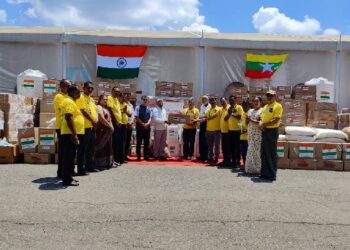The 77th session of the United Nations General Assembly was opened by its new President, Csaba Korosi.
According to the Xinhua news agency, UN Secretary-General Antonio Guterres called for solidarity among member states in his opening remarks on Tuesday.
The many challenges that defined the 76th session of the General Assembly remain, he said, as the new session begins.
“Across our work to advance peace, human rights, and sustainable development, we face a world in peril, from conflicts and climate change to a broken global financial system that fails developing countries, to poverty, inequality, and hunger, to divisions and mistrust.”
“Addressing common challenges will require continued solidarity as we demonstrate the great promise and potential of this organization,” he added.
The United States is the home of cooperation. And the General Assembly is the heart of that house. He told delegates that the coming months will continue to put the multilateral system this organization represents to the test.
“And the world is looking to the members of the assembly to use all of the tools at your disposal to negotiate and forge consensus and solutions: debate, deliberation, diplomacy. These eternal tools represent the best pathway to a better, more peaceful world.”
Korosi called for solutions through solidarity, sustainability, and science in his opening remarks.
He stated that the only way to achieve better results is to transform. “The contours of the necessary transformation are already known. The 2030 Agenda for Sustainable Development, the Sendai Framework (for disaster risk reduction), the Paris Agreement (on climate change), and Our Common Agenda (proposed by United Nations Secretary-General Antonio Guterres) are all steps in the right direction. What remains to be seen is whether we will follow through.”
The world is looking to the United Nations for answers. The General Assembly bears a special responsibility as the world body’s chief deliberative body, he said.
“Having begun my tenure as president, I aim to harness the great talents of this community of member states in forging the systemic solutions needed to transform our world. In accepting this privilege, I vowed to serve as an agent of multilateralism, multiculturalism, and multilingualism,” said the president.
“I pledge that impartiality would be the hallmark of our operation. My team and I will do our best to push for ‘Solutions Through Solidarity, Sustainability and Science,’ the motto I’ve chosen for this presidency.”
He vowed to stand firm on the principles of the UN Charter, which brought member states together 77 years ago and hold them together today.
“Encoded in international law, they (the principles of the UN Charter) provide us with a solid foundation from which to build. From here, I wish to pursue integrated approaches and enhance the role of science in our decision-shaping. I will work to foster measurable progress in the sustainability transformation and cultivate solidarity we need to achieve breakthroughs or to avert further crises and disasters,” he said.
He promised to work closely with the Security Council, the Economic and Social Council, and other relevant UN bodies to advance the critical revitalization process, as well as to pursue the ongoing key reforms spearheaded by Guterres to make the General Assembly and the United Nations as a whole fit for purpose.
According to Korosi, the UnS was formed from the ashes of war and destruction with the intention of becoming a source of solutions.
“Responding to humanity’s most pressing challenges demands that we work together and that we reinvigorate inclusive, networked and effective multilateralism, and focus on what unites us. It is our mission to come together when there are disagreements, and to build bridges when there are deep divides.
“This (General Assembly) hall was created as a place to build trust, to bring about peace and security, development, and human rights. We owe it to our 8 billion constituents — the people we are here to serve — to succeed in our aims,” he said.
Korosi was sworn in at the end of the General Assembly’s 76th session on Monday.
Aside from the General Debate, the high-level week will include a high-level meeting on September 21 to commemorate and promote the 30th anniversary of the adoption of the Declaration on the Rights of Persons Belonging to National or Ethnic, Religious, or Linguistic Minorities, and a high-level meeting on September 26 to commemorate and promote the International Day for the Total Elimination of Nuclear Weapons.
The Transforming Education Summit and the Sustainable Development Goals Moment, both convened by UN Secretary-General Guterres, will take place on September 19.
The start of the high-level week coincides with Queen Elizabeth II’s funeral, which is scheduled for September 19.
Despite the fact that many world leaders will be in London on Monday for the funeral, a UN spokesman said he does not expect any changes to the UN meeting schedule.
“There may be an effect on the speakers’ schedule of who speaks when.” “However, the meetings are proceeding as planned,” said Stephane Dujarric, the chief UN spokesman, on Tuesday.
Source:OCN







 Finance
Finance







